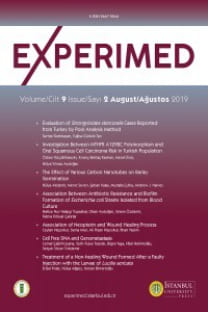Hücre-dışı Fetal DNA‘dan Gerçek-zamanlı PZR ile Fetal Rhesus D tespitinin Maliyet Değerlendirmesi
Hücre dışı fetal DNA, genotipleme, maliyet analizi
Cost Evaluation of Fetal Rhesus D Genotyping by Real-time PCR from cell-free Fetal DNA
Fetal cell-free DNA RHD, genotyping, cost analysis,
___
- 1. Fasano RM. Hemolytic disease of the fetus and newborn in the molecular era. Seminars in Fetal and Neonatal Medicine 2016; 21(1): 28-34. [CrossRef ]
- 2. Kumar S, Regan F. Management of pregnancies with RhD allo-immunisation. British Medical Journal 2005; 330(7502): 1255-8. [CrossRef ]
- 3. de Haas M, Thurik FF, Koelewijn JM, van der Schoot CE. Haemolytic disease of the fetus and newborn. Vox Sanguinis 2015; 109(2): 99-113. [CrossRef ]
- 4. Boggione CT, Luján Brajovich ME, Mattaloni SM, Di Mónaco RA, García Borrás SE, Biondi CS, et al. Genotyping approach for non-in-vasive foetal RHD detection in an admixed population. Blood Transfus 2017; 15(1): 66-73.
- 5. Smits-Wintjens VEHJ, Walther FJ, Lopriore E. Rhesus haemolytic disease of the newborn: Postnatal management, associated mor-bidity and long-term outcome. Semin Fetal Neonatal Med 2008; 13(4): 265-71. [CrossRef ]
- 6. Lo YMD, Bowell PJ, Selinger M, Mackenzie IZ, Chamberlain P, Gil-lmer MDG, et al. Prenatal determination of fetal RhD status by analysis of peripheral blood of rhesus negative mothers. The Lan-cet 1993; 341(8853): 1147-8. [CrossRef ]
- 7. Dovč-Drnovšek T, Klemenc P, Toplak N, Blejec T, Bricl I, Rožman P. Reliable determination of fetal RhD status by RHD genotyping from maternal plasma. Transfus Med Hemotherapy 2013; 40(1): 37-43. [CrossRef ]
- 8. Benachi A, Delahaye S, Leticee N, Jouannic JM, Ville Y, Costa JM. Impact of non-invasive fetal RhD genotyping on management costs of rhesus-D negative patients: Results of a French pilot study. Eur J Obstet Gynecol Reprod Biol 2012; 162(1): 28-32. [CrossRef ]
- 9. González-González C, Garcia-Hoyos M, Trujillo-Tiebas MJ, Lor-da-Sanchez I, Rodríguez De Alba M, Infantes F, et al. Application of fetal DNA detection in maternal plasma: A prenatal diagnosis unit experience. In: Journal of Histochemistry and Cytochemistry 2005; 53(3): 307-14. [CrossRef ]
- 10. Yang H, Llewellyn A, Walker R, Harden M, Saramago P, Griffin S, et al. High-throughput, non-invasive prenatal testing for fetal rhesus D status in RhD-negative women: A systematic review and me-ta-analysis. BMC Medicine 2019; 22(13): 1-172. [CrossRef ]
- 11. Yaşa B, Şahin O, Öcüt E, Seven M, Sözer S. Assessment of Fetal Rhesus D and Gender with Cell-Free DNA and Exosomes from Ma-ternal Blood. Reprod Sci 2020; doi: 10.1007/s43032-020-00321-4 [CrossRef ]
- 12. Lambertino JRM, Villegas SMG. Rh Alloimmunization in pregnan-cy womens, A look to diagnosis and therapeutic approach. Gine-col Obstet Mex 2014; 82(11): 744-54.
- 13. Clausen FB, Barrett AN, Akkök CA, Armstrong-Fisher S, Bergström KD, Boggione CT, et al. Noninvasive fetal RHD genotyping to gu-ide targeted anti-D prophylaxis-an external quality assessment workshop. Vox Sang 2019; 114(4): 386-393. [CrossRef ]
- 14. Schmidt LC, Cabral ACV, Faria MA, Monken F, Tarazona-Santos E, Martins ML. Noninvasive fetal RHD genotyping from maternal plasma in an admixed Brazilian population. Genet Mol Res 2014; 13(1): 799-805. [CrossRef ]
- 15. Macher HC, Noguerol P, Medrano-Campillo P, Garrido-Mírquez MR, Rubio-Calvo A, Carmona-González M, et al. Standardization non-invasive fetal RHD and SRY determination into clinical rou-tine using a new multiplex RT-PCR assay for fetal cell-free DNA in pregnant women plasma: Results in clinical benefits and cost sa-ving. Clin Chim Acta 2012; 413(3-4): 490-4. [CrossRef ]
- 16. Sparks TN, Caughey AB. How should costs and cost-effectiveness be considered in prenatal genetic testing? Seminars in Perinato-logy 2018; 42(5): 275-282. [CrossRef ]
- 17. Darlington M, Carbonne B, Mailloux A, Brossard Y, Levy-Mozzico-nacci A, Cortey A, et al. Effectiveness and costs of non-invasive foetal RHD genotyping in rhesus-D negative mothers: A French multicentric two-arm study of 850 women. BMC Pregnancy Child-birth 2018; 18(1): 496. [CrossRef ]
- 18. Sherwood K, Weimer ET. Characteristics, properties, and potential applications of circulating cell-free dna in clinical diagnostics: a fo-cus on transplantation. Journal of Immunological Methods 2018; 463: 27-38. [CrossRef ]
- 19. Kostenko E, Chantraine F, Vandeweyer K, Schmid M, Lefevre A, Hertz D, et al. Clinical and Economic Impact of Adopting Nonin-vasive Prenatal Testing as a Primary Screening Method for Fetal Aneuploidies in the General Pregnancy Population. Fetal Diagn Ther 2019; 45(6): 413-423. [CrossRef ]
- Yayın Aralığı: Yılda 3 Sayı
- Başlangıç: 2011
- Yayıncı: İstanbul Üniversitesi
İmmünfloresan Yöntemi ile Belirlenen Otoantikorlarda Kadın/Erkek Dağılımı
Nuray GÜREL-POLAT, Nurhas SAFRAN, Gaye ERTEN
Betülinik Asit ve Antikanser Etkiler
Hücre-dışı Fetal DNA‘dan Gerçek-zamanlı PZR ile Fetal Rhesus D tespitinin Maliyet Değerlendirmesi
Büşra YASA, Orhan SAHIN, Selcuk SOZER TOKDEMİR
Genel Anesteziklerin Moleküler Mekanizması
Özge KÖNER, Sibel TEMÜR, Turgay İŞBİR
